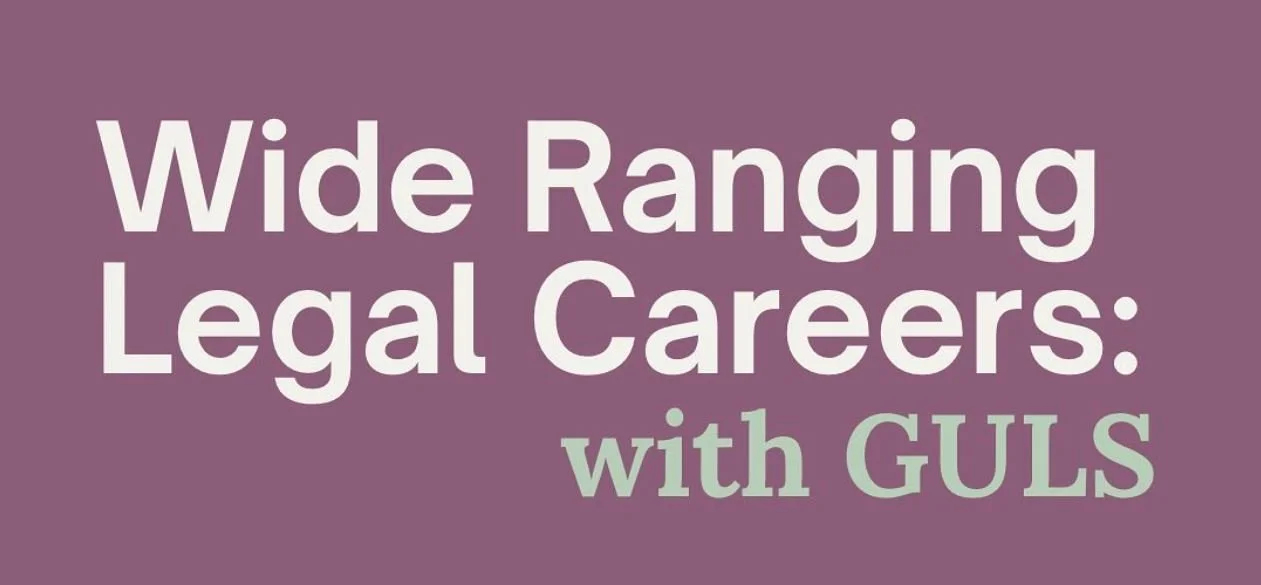Wide Ranging Legal Careers Event: with GULS
By Beste Yasav
On Wednesday 21 February, we had the Wide-Ranging Legal Careers Event; GULS organised this event in conjunction with the School of Law Employability Team. In the event, we had the privilege to meet and chat with many successful people who work in different areas of law. This was an incredible opportunity for us to see the wide range of legal professions available to us and how to shape our career paths according to the part of the legal profession we want to go into.
There were many important names in the event such as Bruce Adamson, Lyndsay Monaghan, Geena Reilly, Andy Sirel, Rhona McNair, Douglas Kerr, David Boag, Diana Stoica, Chad Henshaw, Eamon Keane, Nicole Marshall, Nikki Hunter, Klaudia Szabelka, Felicity Belton, Cameron-Wong McDermott, and Joanna Wilson.
We talked about how the commercial law is seen as the ‘set pathway’ and the financial stability that it brings. It has been discussed that it is a more factual and standard route, although achieving a work-life balance can be very difficult when you practise law, especially in the first few years. Our guests who currrently practise or have practised law, shared their experiences and stated that work-life balance tends to get easier in management/senior positions (after 6/7 years) if you have some financial stability by then.
On the other hand, the successful women in law in the room also pointed out the challenges of not having a work-life balance, especially if you have a family. We discussed how more women change their roles in the firms or the field they work in, when they have kids, to make sure they have the time to spend with their family.
After a very inspiring chat with Lyndsay Monaghan, a Senior Associate Solicitor in the Scottish Women’s Rights Centre (Just Right Scotland), we found out that although working in human rights might not have a career pathway as standard as commercial law, it is satisfying in other ways. She said that feeling that you are making a change and helping people are very powerful feelings. She also mentioned the importance of volunteering and how it provides you with the training of working with people, especially the more vulnerable people that you tend to work with in the human rights field as well. She mentioned the challenges in the early stages of her career and how it affected her emotionally. We also had a chat about how firms are getting better with mental health support and counselling. She stated that the cases you take on can be heavy both emotionally and mentally, however she also said that you learn to separate your personal and professional life.
Even though it might not be possible or easy to de-personalise the cases, you get better at dealing with them and the firms support you with such cases. Lastly, she mentioned that the traineeship route is not the only route to become a lawyer; you can still appear in front of the court or do policy work without the traineeship experience, depending on the role. Hence, we spoke about alternative ways and how a career in human rights may stem from different pathways.
Douglas Kerr, who is a civil servant and a solicitor, talked to us about working in government. He said work-life balance in the government tends to be better than private firms and he mentioned that doing his traineeship in the same place helped him get a job there. We also talked about how you can move about in the different departments of the government and how it is easier to change departments, compared to a private firm. He also talked about how working in the government can be interesting, especially if you have an interest in politics, since you get to have meetings with the MPs and get involved in politics to some extent. Lastly, he mentioned that doing an LLM helped him and gave him a year to see his mistakes in his applications and what to do/not to do in other application processes.
Finally, Joanna Wilson, who is a lecturer, Deputy Director of the Law for Social Change Research Group and Honours Year Lead at the University of the West of Scotland, shared how she decided she wanted to go into academia. She mentioned she is the daughter of two teacher parents and how this affected her decision. Besides this, she talked about the lecturer she had in the University of St Andrews, a Scottish female lecturer, who made her think that could be her and how she wanted to teach after that experience. We also chatted about being an academic and balancing teaching with research. Joanna mentioned that it helps her to separate the two from each other and focus on teaching during the academic term and on research during summer. She said she finds it easier when she can focus fully on one thing at a time and how she thinks that also works better for her family life, so she can spend her free time with her family.
To conclude, meeting and chatting with sixteen incredible people, who are working in different areas of law, was a very inspiring and helpful event for us students. It gave us the opportunity to ask our questions and learn about the experiences of our guests. This was also a very valuable experience for us to network and learn the best ways to get involved in different areas of law.
Beste Yasav is a final year Common Law LLB student at the School of Law.


